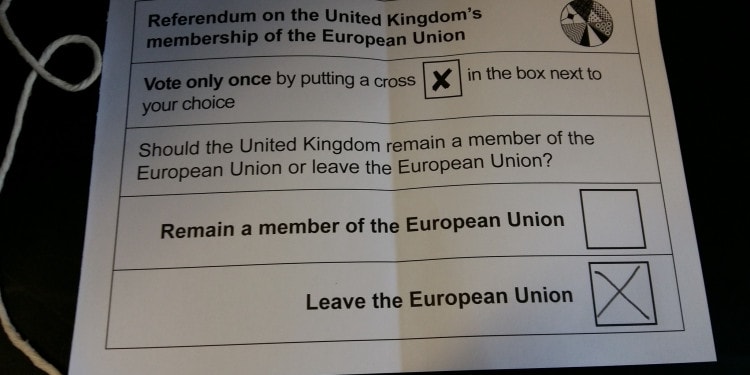Living in Oxford just before the UK referendum (or ‘Brexit’) this summer, I asked several people in this beautiful university town what their opinion was on the matter, and what they thought the outcome was going to be.
In Oxford as well as in London, there was a sense of confidence that Brexit was not going to happen. It was too important for both cities to remain in the EU, so the possibility of Brexit was scarcely entertained. Oxford and its world-famous university system include students coming from all over the world (including the rest of the EU) to study and conduct invaluable research. London’s economy heavily relies on both highly skilled EU workers working for multinational companies and young Europeans working in sectors like food service and hospitality. These cities realized that any changes or limitations to the status quo, including the reintroduction of barriers to freedom of movement with other European countries, would cause significant setbacks to their economic and social well-being.
 In The PHOTO:: Oxford. PHOTO CREDIT: Marlo Sanchez Prado / Flickr
In The PHOTO:: Oxford. PHOTO CREDIT: Marlo Sanchez Prado / Flickr
As an optimist, I simply don’t believe in a European Union without the United Kingdom. I have spent the last couple of months looking at all the possible scenarios that can potentially reverse the referendum outcome. I spoke with locals in Oxford and got to know their thoughts about Brexit.
According to many, Brexit may not happen at all. Below are the reasons why this may indeed be the case.
First of all, as it is the first time that a country has decided to leave the Union, the procedure is still tentative and consequences unknown. European leaders from the Union’s member states are pushing to make this process as fast as possible. They want to take advantage of this situation wherein many multinational companies will be looking for a place to relocate their offices, from the UK to elsewhere in Europe, in order to secure more certainty for their operations and greater market access.
In addition, EU leaders think it would not make much sense to have UK politicians remain members of the European Parliament and other European institutions following the vote – particularly those who were active in the Leave campaign. The European Union will also have to decide how to manage its foreign relations with the UK; if the British people are still involved in the decision-making process surrounding this issue, it may turn up a biased result.
Related Article:
” BREXIT DOMINO EFFECT: RISKS AND CONSEQUENCES”
Interestingly, right after the vote, the main proponent of the Leave campaign, Nigel Farage, declared that one of the campaign’s key promises about moving the money the UK pays towards its EU membership to support the National Health Service was not completely true. Farage almost immediately decided to retire from politics, considering that he achieved his goal.
British people may want Brexit, but they want to do it in their own way.
Whatever the intentions of the UK, they have to first declare that they wish to trigger Article 50 of the Lisbon Treaty before its formal exit process can begin. Only at this time can the process commence. Article 50 states that once a country has decided to leave the Union, it has to start to negotiate the terms of an agreement for withdrawal, and, before being approved, the terms need to be voted by Parliament and approved by the Council.
 IN THE PHOTO: Leave Supporters Banner. PHOTO CREDIT: Diamond Geezer / Flickr
IN THE PHOTO: Leave Supporters Banner. PHOTO CREDIT: Diamond Geezer / Flickr
The consequences of this process would be dramatic. Even if Prime Minister Theresa May refused to talk about a massive deportation of all the European workers who would not obtain a visa, she would just mention that the Brexit vote day could be considered a crucial date. If you were in the UK prior to the vote and you had a full-time job, you could remain in the country. Otherwise, you would need to leave.
This is not as simple as it sounds. In London, for instance, one can see foreign workers everywhere and in every sector. There are so many Italian nationals living in London that it would be considered the fourth most populous Italian city in the world – including Italy’s own cities. The same could be said for many other foreign workers. And if we can forget for a moment about these peoples’ lives and focus on the economic consequences instead, the question is: who is going to replace all those workers? These people are likely paying high rents for houses, and spending a significant amount of their salaries in the diverse cultural and entertainment offerings around London. This is all likely to drop post-Brexit.
For a full mindmap containing additional related articles and photos, visit #brexit
As a direct and immediate consequence of Brexit, the housing market prices dropped rapidly. After all who wants to invest in something that will not be possible to rent easily? According to supporters of the Remain campaign, the economy as a whole will face a strong recession. The value of the British Pound, for instance, has already dropped significantly following the vote and has yet to rebound.
One of the possible scenarios is that the UK will be forced to re-vote on exiting the Union. The results of the previous vote were not binding. The vote itself was merely an opinion asked to the citizens. The question which would in fact have made it binding should have been: “Do you wish to activate Article 50 of the Lisbon Treaty to allow the United Kingdom to exit the European Union?”
In addition, one of the lead campaigners for the vote on Brexit started a petition before the date of the referendum that would eventually end up going against his intended interests. In the petition, which was later signed by over two million people in the hours after the vote, he asked that the referendum be repeated if less than 75% of the population participated in the voting process. Given the strong popular support for a new vote, it no longer seems such a remote possibility.
Another scenario that could possibly block the Brexit is Scotland’s opposition. According to some jurists, if the United Kingdom’s constituent countries fail to unanimously agree on leaving the European Union, then the UK has no right to do so.
Another possibility is that Scotland could vote again to leave the United Kingdom. The results might be different this time as the majority of Scotland voted to remain in the European Union. A similar situation could happen in Northern Ireland – another region that saw a majority of its people vote to remain in the EU. Many have discussed the potential reunification of Northern Ireland with the Republic of Ireland – a situation that would be truly historic.
While those regional scenarios remain uncertain, surprisingly few government leaders decided to step out against Brexit after the vote. Prime Minister Theresa May, whose restrictive policies on non-EU student immigration caused massive headaches to foreign students in the UK, is pursuing a fast Brexit procedure. She will most likely pursue the voting result and push for Brexit unless other events happen and circumstances change. London Mayor Sadiq Khan, one of the key emerging figures in British politics, has stated his wholehearted disapproval with Brexit, knowing the potential negative consequences for his city, which is home to international companies, immigrant populations, and students from abroad.
But again, if no one in office outright supports policies to remain part of the Union, this is all merely wishful thinking.
The younger generations and university towns like Oxford and Cambridge all voted against Brexit. Leveraging this aspect could be the definitive way to stop Brexit from happening. Young people view Brexit as terrifying from an economic point of view as it leaves a tentative and uncertain situation to fester.
But waiting is also the most attractive option. If the triggering of Article 50 moves slowly, a new generation will eventually take over the decision-making surrounding the UK’s role within the EU. This generation will slowly take power and there may just be another vote on Brexit in the future. Possible issues with this are connected to the timing; it might be too late to take back the Brexit vote and order a new one. Also, after the initial shock, the population has gone into an acceptance phase and no one is stepping up anymore to take aggressive action against Brexit.
The UK’s future will all depend on the vote in the next general election. Afterward, European leaders will go straight to the new Prime Minister and ask him or her to make a clear decision. It is again an unknown step into an unknown future.
Similar referendums are likely to take place in other European countries. This will be the time when the Union will have to decide if it should be stronger with fewer borders among the states, or let each member state go its own way. Nations like Italy, France and Germany don’t see any future without the Union. But the same cannot be said in countries like Poland or in eastern Europe where nationalist sentiment is strong.
This is certainly not the end of the EU. It is perhaps merely a difficult phase when countries must realize what they should do to make the Union stronger. In every European country, there is an anti-immigration/far-right party that is pushing against the Union, but each largely remains safely distant from earning the majority of the votes. Will new European leaders and political visionaries be able to convince voters that the EU is the only possible future?
 IN THE PHOTO: March for Europe. PHOTO CREDIT: Alex/ Flickr
IN THE PHOTO: March for Europe. PHOTO CREDIT: Alex/ Flickr
Recommended reading: “SO WHAT WILL BREXIT REALLY MEAN”
_ _









